How to stop getting ads from connectscreen.xyz
Notification SpamAlso Known As: Ads by connectscreen.xyz
Get free scan and check if your device is infected.
Remove it nowTo use full-featured product, you have to purchase a license for Combo Cleaner. Seven days free trial available. Combo Cleaner is owned and operated by RCS LT, the parent company of PCRisk.com.
What kind of page is connectscreen[.]xyz?
We have inspected connectscreen[.]xyz and determined that it uses clickbait, a misleading technique, to trick users into agreeing to get its notifications. If connectscreen[.]xyz has permission to show notifications, it promotes various scams, unwanted apps, and similar content. Users should not trust connectscreen[.]xyz.
![connectscreen[.]xyz ads](/images/stories/screenshots202503/connectscreen-xyz-ads-main.jpg)
Connectscreen[.]xyz in detail
Connectscreen[.]xyz displays a message claiming to have detected suspicious traffic from the user's network. It then prompts the user to verify that they are not a robot by clicking a button (the "Allow" option provided by their browser). The page is designed to mislead users into giving it permission to show notifications.
If allowed, connectscreen[.]xyz can send fake notifications that suggest the user's computer is infected with multiple viruses. These fake warnings claim that the system is compromised and prompt the user to click a link to renew antivirus protection or delete the supposed viruses.
The notifications also encourage users to activate protection, misleading them into thinking they need to take urgent action to protect their devices. These messages are designed to trick users into interacting with them. Doing so can lead users to a range of untrustworthy websites hosting scams, unwanted (or malicious) apps, and other malicious content.
On these pages, users may be tricked into disclosing sensitive information (e.g., passwords, ID card information, or credit card details), transferring money to scammers, downloading potentially malicious programs, or taking other actions. This can lead to computer infections, monetary loss, identity theft, and other negative outcomes.
Therefore, it is important to avoid visiting sites like connectscreen[.]xyz and never agree to receive their notifications.
| Name | Ads by connectscreen.xyz |
| Threat Type | Push notifications ads, Unwanted ads, Pop-up ads |
| Detection Names | Forcepoint ThreatSeeker (Suspicious), Seclookup (Malicious), Sophos (Spam), Webroot (Malicious), Full List Of Detections (VirusTotal) |
| Serving IP Address | 172.67.196.192 |
| Symptoms | Seeing advertisements not originating from the sites you are browsing. Intrusive pop-up ads. Decreased Internet browsing speed. |
| Distribution Methods | Deceptive pop-up ads, false claims within visited websites, unwanted applications (adware) |
| Damage | Decreased computer performance, browser tracking - privacy issues, possible additional malware infections. |
| Malware Removal (Windows) |
To eliminate possible malware infections, scan your computer with legitimate antivirus software. Our security researchers recommend using Combo Cleaner. Download Combo CleanerTo use full-featured product, you have to purchase a license for Combo Cleaner. 7 days free trial available. Combo Cleaner is owned and operated by RCS LT, the parent company of PCRisk.com. |
Similar pages in general
Users often encounter sites like connectscreen[.]xyz via misleading ads, suspicious links in emails or messages, or deceptive pop-ups and notifications from unreliable websites. In some instances, software or apps downloaded from untrustworthy sources may lead users to these dubious pages.
Moreover, rogue advertising networks commonly used by torrent sites, illegal streaming services, and similar platforms can be utilized to promote such sites. Other examples of websites that may send fake notifications include sougraiwhie[.]com, thedollarpress[.]com, and theadspoint[.]top.
How did connectscreen[.]xyz gain permission to deliver spam notifications?
When users visit a site like connectscreen[.]xyz, they are prompted to allow the site to send notifications. If they click the "Allow" button, the site gains permission to send notifications. Consequently, notifications from connectscreen[.]xyz show up because the site has been allowed to display them.
How to prevent deceptive sites from delivering spam notifications?
Web browsers offer users the option to reject notification requests through choices like "Block", "Deny", or "Block Notifications". To prevent receiving unwanted notifications, users should select one of these options if the website appears suspicious and then close the site. If you are receiving unwanted notifications, we recommend running a scan with Combo Cleaner Antivirus for Windows to automatically eliminate them.
Appearance of connectscreen[.]xyz website (GIF):
![connectscreen[.]xyz website appearance (GIF)](/images/stories/screenshots202503/connectscreen-xyz-ads-appearance.gif)
Notification from connectscreen[.]xyz:
![connectscreen[.]xyz notification](/images/stories/screenshots202503/connectscreen-xyz-ads-notification.jpg)
Instant automatic malware removal:
Manual threat removal might be a lengthy and complicated process that requires advanced IT skills. Combo Cleaner is a professional automatic malware removal tool that is recommended to get rid of malware. Download it by clicking the button below:
DOWNLOAD Combo CleanerBy downloading any software listed on this website you agree to our Privacy Policy and Terms of Use. To use full-featured product, you have to purchase a license for Combo Cleaner. 7 days free trial available. Combo Cleaner is owned and operated by RCS LT, the parent company of PCRisk.com.
Quick menu:
- What is Ads by connectscreen.xyz?
- STEP 1. Remove spam notifications from Google Chrome
- STEP 2. Remove spam notifications from Google Chrome (Android)
- STEP 3. Remove spam notifications from Mozilla Firefox
- STEP 4. Remove spam notifications from Microsoft Edge
- STEP 5. Remove spam notifications from Safari (macOS)
Disable unwanted browser notifications:
Video showing how to disable web browser notifications:
 Remove spam notifications from Google Chrome:
Remove spam notifications from Google Chrome:
Click the Menu button (three dots) on the right upper corner of the screen and select "Settings". In the opened window select "Privacy and security", then click on "Site Settings" and choose "Notifications".
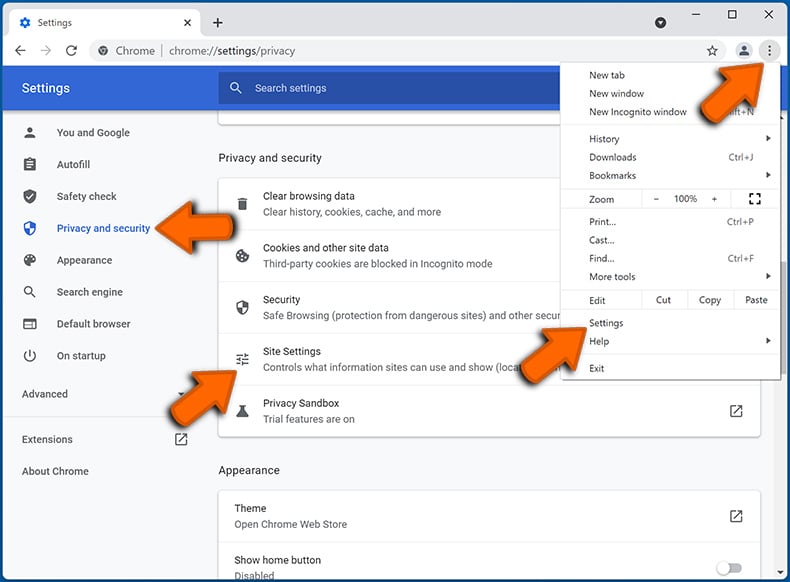
In the "Allowed to send notifications" list search for websites that you want to stop receiving notifications from. Click on the three dots icon near the website URL and click "Block" or "Remove" (if you click "Remove" and visit the malicious site once more, it will ask to enable notifications again).
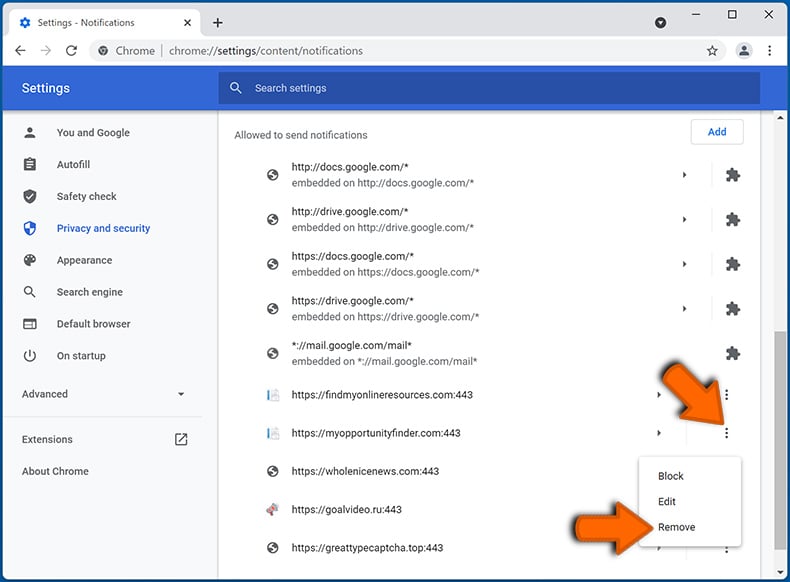
 Remove spam notifications from Google Chrome (Android):
Remove spam notifications from Google Chrome (Android):
Tap the Menu button (three dots) on the right upper corner of the screen and select "Settings". Scroll down, tap on "Site settings" and then "Notifications".
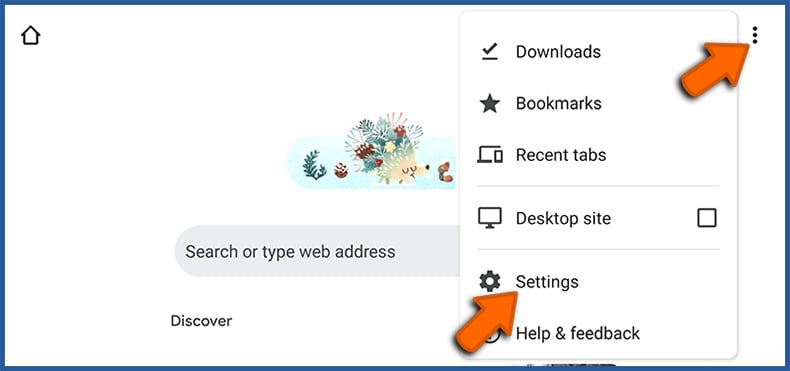
In the opened window, locate all suspicious URLs and tap on them one-by-one. Once the pop-up shows up, select either "Block" or "Remove" (if you tap "Remove" and visit the malicious site once more, it will ask to enable notifications again).
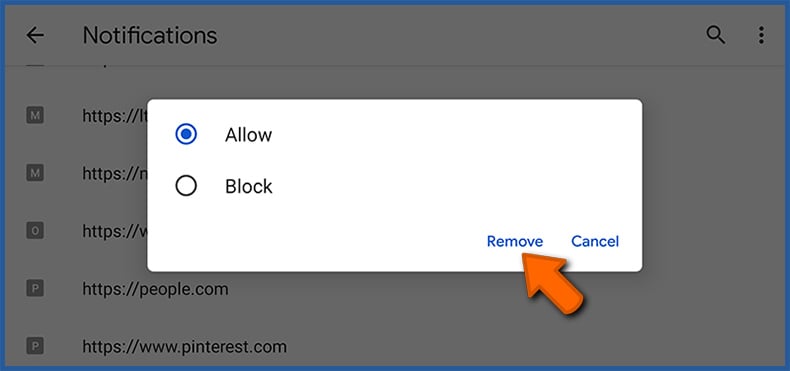
 Remove spam notifications from Mozilla Firefox:
Remove spam notifications from Mozilla Firefox:
Click the Menu button (three bars) on the right upper corner of the screen. Select "Settings" and click on "Privacy & Security" in the toolbar on the left hand side of the screen. Scroll down to the "Permissions" section and click the "Settings" button next to "Notifications".
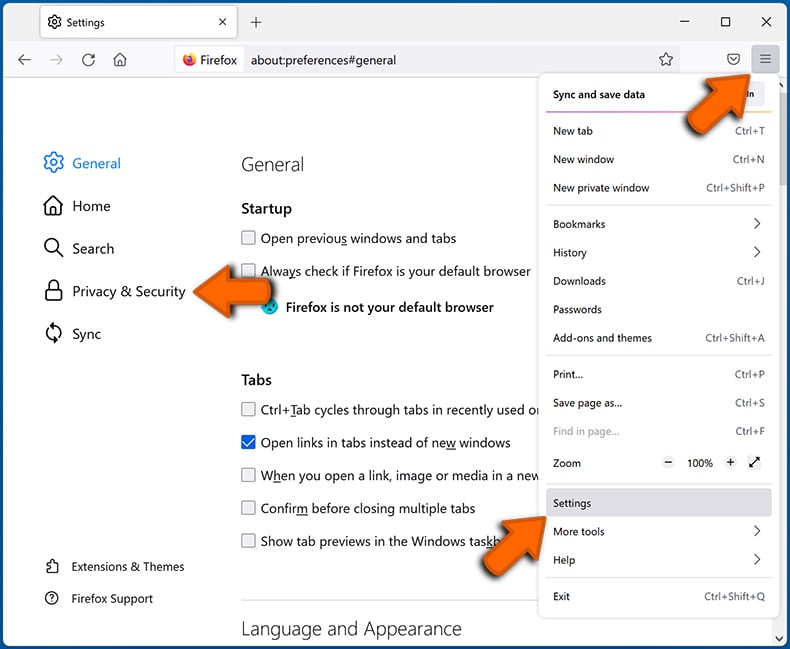
In the opened window, locate all suspicious URLs and block them using the drop-down menu or either remove them by clicking "Remove Website" at the bottom of the window (if you click "Remove Website" and visit the malicious site once more, it will ask to enable notifications again).
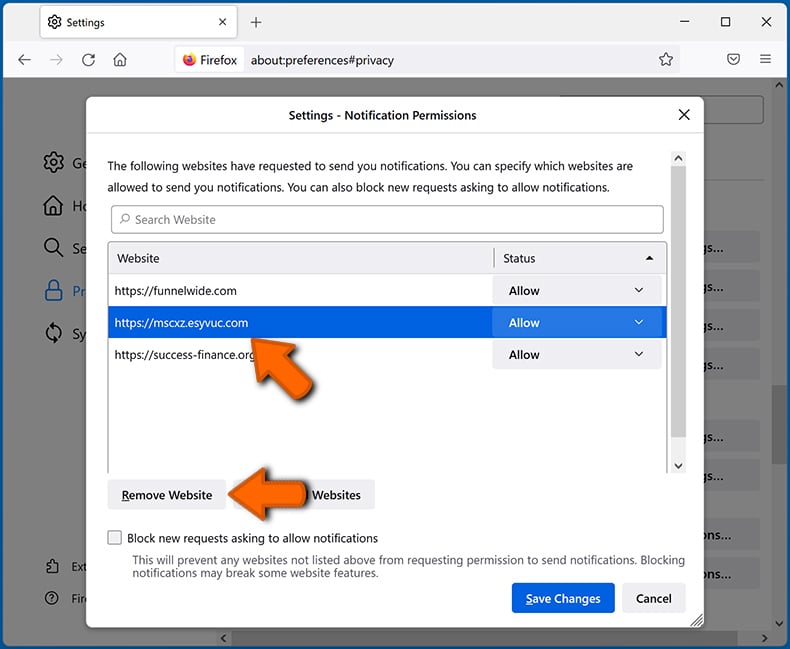
 Remove spam notifications from Microsoft Edge:
Remove spam notifications from Microsoft Edge:
Click the menu button (three dots) on the right upper corner of the Edge window and select "Settings". Click on "Cookies and site permissions" in the toolbar on the left hand side of the screen and select "Notifications".
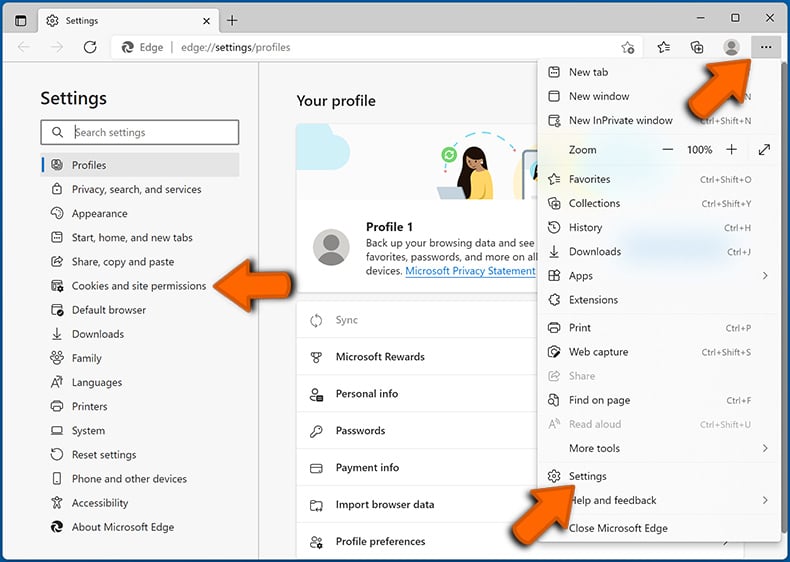
Click three dots on the right hand side of each suspicious URL under "Allow" section and click "Block" or "Remove" (if you click "Remove" and visit the malicious site once more, it will ask to enable notifications again).
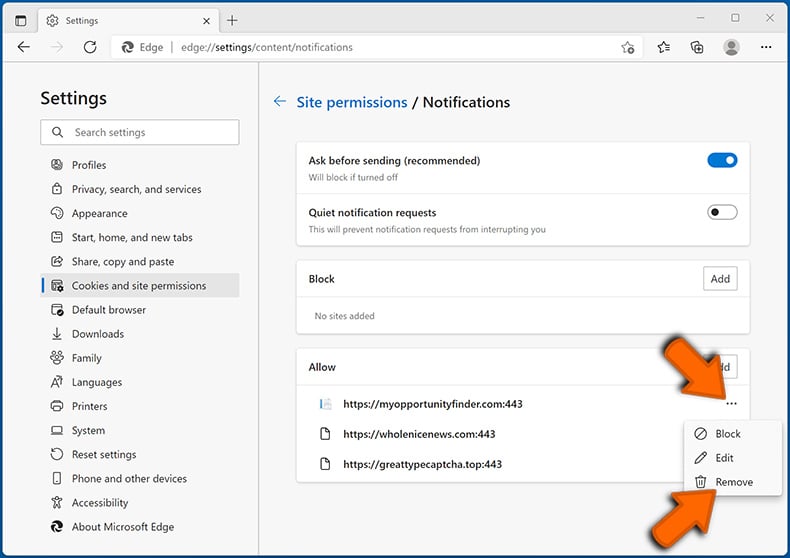
 Remove spam notifications from Safari (macOS):
Remove spam notifications from Safari (macOS):
Click "Safari" button on the left upper corner of the screen and select "Preferences...". Select the "Websites" tab and then select "Notifications" section on the left pane.
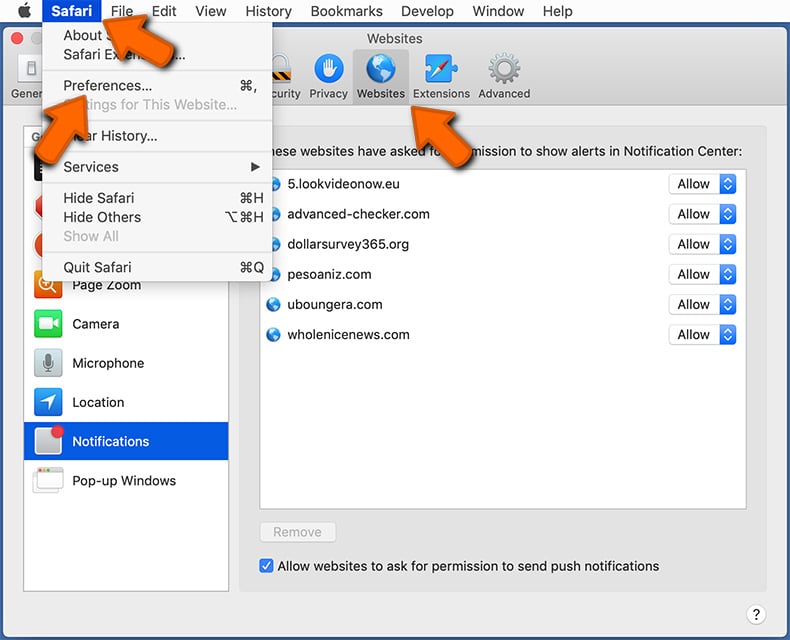
Check for suspicious URLs and apply the "Deny" option using the drop-down menu or either remove them by clicking "Remove" at the bottom of the window (if you click "Remove" and visit the malicious site once more, it will ask to enable notifications again)
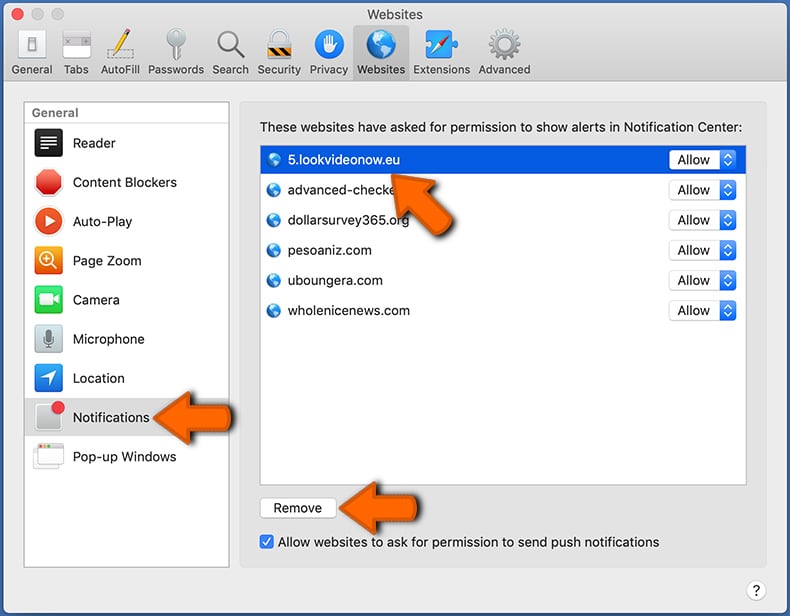
How to avoid browser notification spam?
Internet users should be very skeptical when being asked to allow notifications. While this is a useful feature that allows you to receive timely news from websites you like, deceptive marketers frequently abuse it.
Only allow notifications from websites that you fully trust. For added security - use an anti-malware application with a real-time web browsing monitor to block shady websites that tries to trick you into allowing spam notifications. We recommend using Combo Cleaner Antivirus for Windows.
Frequently Asked Questions (FAQ)
Why am I seeing ads (browser notifications) delivered by connectscreen[.]xyz in the right lower corner of my desktop?
If a website wants to show notifications, the user must first approve the request. This indicates that you probably visited connectscreen[.]xyz and have already granted it permission to send notifications.
I have clicked on notification ads, is my computer infected?
Clicking a notification from an unreliable website may not cause instant damage, but it can lead you to harmful pages.
Is connectscreen[.]xyz a virus?
Websites like connectscreen[.]xyz are not viruses. However, most of them use notifications (if allowed to send them) to promote scams and untrustworthy websites, and potentially malicious software.
Will Combo Cleaner remove connectscreen[.]xyz ads automatically or manual steps are still required?
Combo Cleaner will scan your computer, revoke all permissions given to connectscreen[.]xyz, and block any further access to it. No further action will be needed on your part.
Share:

Tomas Meskauskas
Expert security researcher, professional malware analyst
I am passionate about computer security and technology. I have an experience of over 10 years working in various companies related to computer technical issue solving and Internet security. I have been working as an author and editor for pcrisk.com since 2010. Follow me on Twitter and LinkedIn to stay informed about the latest online security threats.
PCrisk security portal is brought by a company RCS LT.
Joined forces of security researchers help educate computer users about the latest online security threats. More information about the company RCS LT.
Our malware removal guides are free. However, if you want to support us you can send us a donation.
DonatePCrisk security portal is brought by a company RCS LT.
Joined forces of security researchers help educate computer users about the latest online security threats. More information about the company RCS LT.
Our malware removal guides are free. However, if you want to support us you can send us a donation.
Donate
▼ Show Discussion